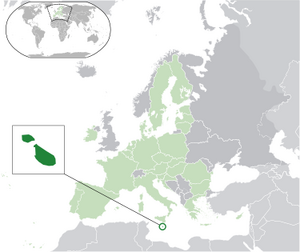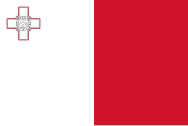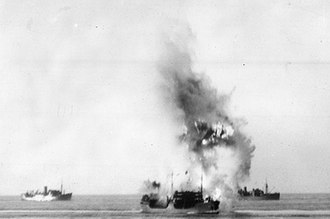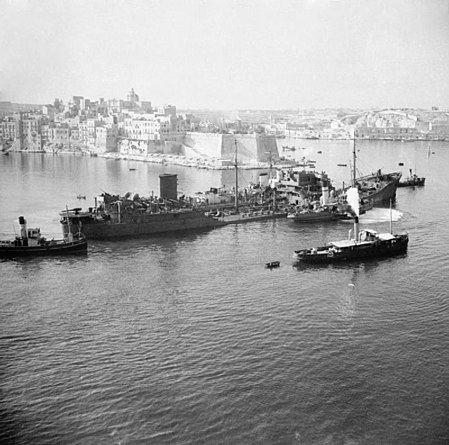Malta
| Republic of Malta |
|
(and Malta's largest city) |
Source information is available at [ Sources ] |
Malta, officially the Republic of Malta, is an island country in Southern Europe in the Mediterranean Sea. It consists of an archipelago 80 km (50 mi) south of Italy, 284 km (176 mi) east of Tunisia, and 333 km (207 mi) north of Libya. The two official languages are Maltese and English. The country's capital is Valletta, the smallest city in the EU in terms of area and population. With a population of about 542,000 over an area of 316 km2 (122 sq mi), Malta is the world's tenth-smallest country by area and the ninth most densely populated. Various sources consider the country to consist of a single urban region, for which it is often described as a city-state.
Malta has been inhabited since about 5900 BC. Its location in the center of the Mediterranean has historically given it great geostrategic importance, with a succession of powers that have ruled the islands and shaped its culture and society. These include the Phoenicians, Carthaginians, Greeks, and Romans in antiquity; the Arabs, Normans, and Aragonese during the Middle Ages; and the Knights Hospitaller, French, and British in the modern era. Malta came under British rule in the early 19th century and was the headquarters for the British Mediterranean Fleet. It was besieged by the Axis powers during World War II and was an important Allied base for North Africa and the Mediterranean. Malta achieved independence in 1964 and established its current parliamentary republic in 1974. Since independence, it has been a member state of the Commonwealth of Nations and the United Nations; it joined the European Union in 2004 and the eurozone monetary union in 2008.
Malta's long history of foreign rule and proximity to Europe and North Africa have influenced its art, music, cuisine, and architecture. Malta has close historical and cultural ties to Italy, especially Sicily; 62 and 66 percent of Maltese people speak or have significant knowledge of the Italian language, which had official status from 1530 to 1934. Malta was an early center of Christianity, and Catholicism is the state religion, although the country's constitution guarantees freedom of conscience and religious worship.
Malta is a developed country with an advanced high-income economy. It is heavily reliant on tourism, attracting both travelers and a growing expatriate community with its warm climate, numerous recreational areas, and architectural and historical monuments, including three UNESCO World Heritage Sites: Ħal Saflieni Hypogeum, Valletta, and seven megalithic temples, which are some of the oldest free-standing structures in the world.
History
|
Spanking and Spanking Art in Malta
In the 20th century, school corporal punishment fell out of fashion and was gradually banned in many countries, a trend that continues until the present day.
As of May 2008, Malta prohibits corporal punishment in schools.
( We have no further information from SAOTK as of Oct, 2024 )
( We have no further information from Corpun.com as of Oct, 2024 )
Prostitution in Malta
- Prostitution in Malta ↗ on Wikipedia
Malta external links
- More information is available at [ Wikipedia:Malta ]
Chat rooms • What links here • Copyright info • Contact information • Category:Root



